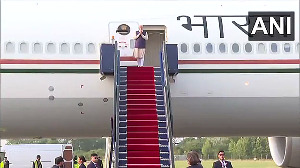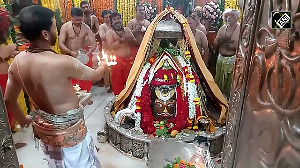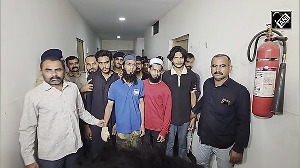I was travelling by train in South India recently, and the others around all happened to be Hindi speakers. One of them sang Hindi film songs quite well. He sang old songs that I recognised and remembered; and once again it occurred to me how beautiful Hindi film music can be even if one doesn't understand or pay attention to the words. I remember reading that Satyajit Ray also liked Hindi film music, and surely he was an expert.
I know a fair amount of Hindi, having studied it in school in Kerala. I know a lot of Sanskrit words through Malayalam, but I am defeated by the Persian and Arabic words in colloquial Hindi, in particular in Urdu-dominated film-song lyrics. These words are completely alien; and so I have given up trying to understand the lyrics. This has become a problem when I wish to buy a Hindi cassette or CD -- for I have no idea which lovely music goes with which strange lyric that I cannot recognise.
It is not that I do not know any Arabic words: there are some in the Malayalam of the Moplah Muslims, which I have come to know from the works of Vaikom Mohammed Basheer, for instance. Iblis: devil; kabar: grave; rub: god; humck: naughty child; nikah: wedding; halak: difficulty. And there are Arabic/Persian words in Malayalam related to governance and law: wakalat, legal brief; taluk: sector; jilla: district; harji: petition; mahassir: report.
I was startled to hear that tarjama: translation, is of Arabic origin, as it is so familiar. And I learned recently that jawahar: gem, is Arabic. The name of Saudi King Fahd's favourite wife is Jawahira. An Arab who comes to India must be bemused to find a word in their language all over the place: deplane at the Jawahar airport, attend Jawahar University, watch a game at the Jawahar stadium, visit a friend in Jawahar Nagar, etc, etc.
Similarly, I read that Jawaharlal Nehru broke into tears after the 1962 India-China war upon hearing a song, 'Aae mere vatan ke logon.' This baffled me. I know the Sanskrit vadanam, face, but clearly that is irrelevant. I recently read that a major newspaper in Saudi Arabia is named al-Watan, 'the nation,' so that's cleared up the mystery.
Speaking of the Arab connection, I have heard that Arabs refer to Kerala phonetically as khair-allah, land blessed by their God, remarkably similar to the advertising slogan, 'God's Own Country.' I first heard that phrase in relation to the US, much before Kerala's tourism department expropriated it, when my acerbic but thoughtful professor Anthony Reddy referred to the IIT's as 'finishing schools for the middle classes,' sometimes adding, 'on their way to God's own country.'There are interesting English words with an Arabic link: tamarind, from tamar-i-hind, Indian date. Some may have Indian connections: algebra and algorithm, perhaps related to the works of Indian mathematicians like Bhaskara; the stars Algol and Aldebaran and mausam: season -- whence monsoon -- related to Indian astronomy; alchemy and alkali, like damascene, may be related to advanced Indian chemical technology.
It also struck me that the Arabic-Persian-Urdu influence is what makes spoken Hindi so clipped, with its consonant endings, forgoing the standard 'a' and 'a:' endings in Sanskrit. For Hindi is spoken like the West Asian tongues, which suffer from a paucity of vowels. Therefore most words end sharply in some consonant. I find this jarring. For example when anyone misconstrues and mispronounces the venerable Veda Vyasa as 'Ved Vyas,' I am uncontrollably reminded of American serial killer Ted Bundy: same abrupt and sudden ending, a far cry from the more mellifluous and continuous real Sanskrit.
I am nonplussed at hearing about 'Shiv' and 'Ram' and 'Krishan,' whereas they are 'Siva,' 'Rama' and 'Krishna.' It is Kerala, or Keralam, you know, not Keral.
I am not claiming Sanskrit should be pronounced thus and so out of regional chauvinism. It can easily be proven through the rules of sandhi (the way compound words are created in Sanskrit) that the 'a' or 'a:' ending is necessary, else you have to invent all sorts of plainly non-existent words.
It amuses me that Hindis assume that they, ipso facto, pronounce Sanskrit correctly, simply because they use the Devanagari script. In fact Hindi and Sanskrit are two languages divided by the same script, like the famous saying about America and Britain. Two languages can use the same script but can be utterly different: for example English and Bahasa Indonesia (compare to bhasha, language, in Sanskrit), both written in Roman script, but with nothing in common. Similarly, Hindi sharing Devnagari with Sanskrit is a red herring: yeah, that's nice, but it is irrelevant.
Sanskrit is written not only in Devanagari. Original Sanskrit literature is and has been composed in other scripts in India: for instance, Telugu, Kannada, Bengali, Marathi and Malayalam. The fact is that the scripts for all these languages are exactly equivalent to Devanagari (a one-to-one correspondence, to be precise). There are a sometimes a few additional consonants, for instance the 'zha' and the hard 'la', but this is immaterial. Tamil, with fewer consonants, does not have this equivalence, so Sanskrit cannot be written exactly in the Tamil script, just as it cannot be in the Roman script.
Hindi/Urdu evolved out of a synthesis (Hindustani) of Arabic/Persian and various apabhramsams, Sanskrit-influenced local languages such as Maithili, Bhojpuri, Braj-bhasha, and so forth. This is the way languages grow, of course: much as English was a hybrid of Anglo-Saxon native words and the Latin of the Romans.
Somewhere along the line, the standard pronunciation of Hindustani became much closer to Arabic/Persian, and so the Urdu script, which is pretty similar to Arabic, is perhaps the right script for Hindustani. But at the time of Independence, someone decided that Hindustani written in Devanagari, that is Hindi, would be an official language of India, along with English. Let me note here in passing that Hindi is not India's national language; or more precisely, it is only one of 16 or 17 national languages, those on the currency notes. Says who? The Indian Constitution!
For those of us who are challenged in Arabic and Persian, like me, there may be some hope: I read recently of an Urdu-Hindi dictionary. I hope Hindis use this to replace Arabic/Persian words with perfectly good Sanskrit-derived ones, which we poor Southerners can also understand. For instance, I think prem would be a fine substitute for ishq. After glancing at Hindi film posters for years, I still have no idea what qayamat means. I should buy that dictionary.
Postscript:
I would like to recommend an incredible CD/Videotape named The Genius of India, a labour of love by Christine, Olivier, and Serge, of Auroville, near Pondicherry. It is a stunning introduction to the wonder that is Indian culture; with the words of Sri Aurobindo recited by strong male and female voices with the backdrop of exquisite photographs and music.
The photographs are outstanding: they show with immediate, vivid intensity the creativity and originality of Indian art; the beauty of the Indian landscape; and the grace of gesture and ritual among the general public. The sound track is even more amazing: from stone cutters' chisels, to ringing temple bells, to a crystalline voice singing a Sanskrit hymn.
Yet, we watch this slide show and we realise how little we know of the spiritual and artistic legacy of the ancient culture of India. I believe every schoolchild in India should be shown this slide show. Not only every schoolchild, but every adult, since all our brains have been addled by disinformation.
The VCD, with both English and Hindi versions of the audio, is available from www.auroville-press.com or by writing to 'Genius of India,' Auroville Press, Auroville, Tamil Nadu 605 101 in India for Rs. 250 plus shipping for local orders.
The equivalent videocassette in American format is available from the Auroville Information Office at PO Box 676, Woodstock NY 12498, for $19.95 plus $3 shipping and handling. You may also contact aviny@aviusa.org or check out the site www.auroville-international.org






